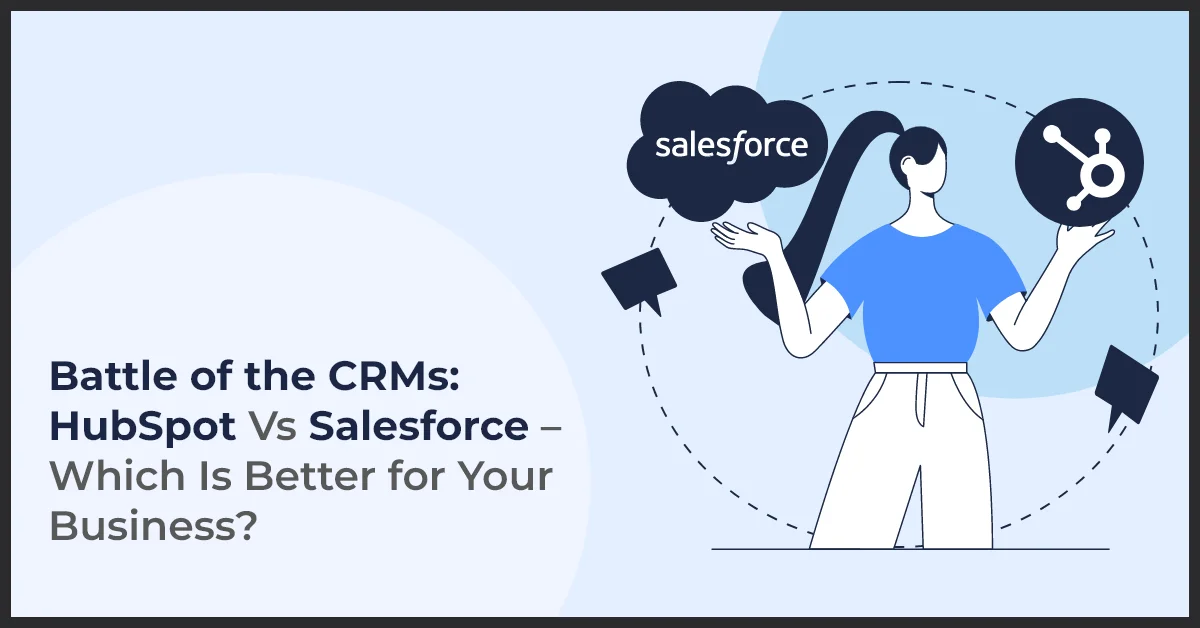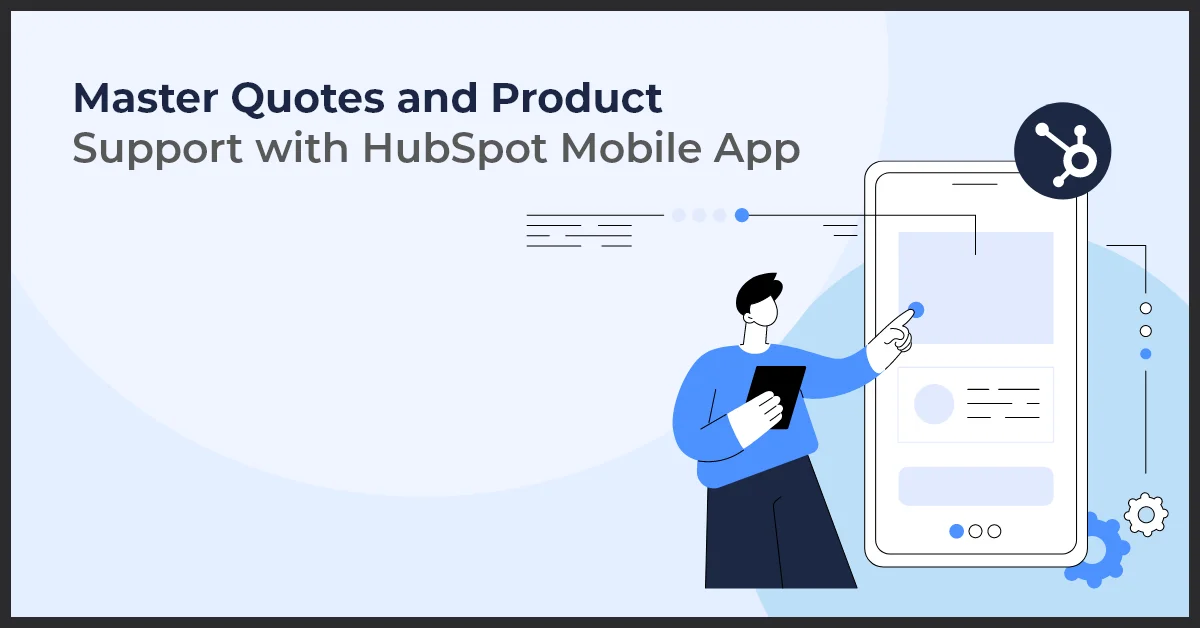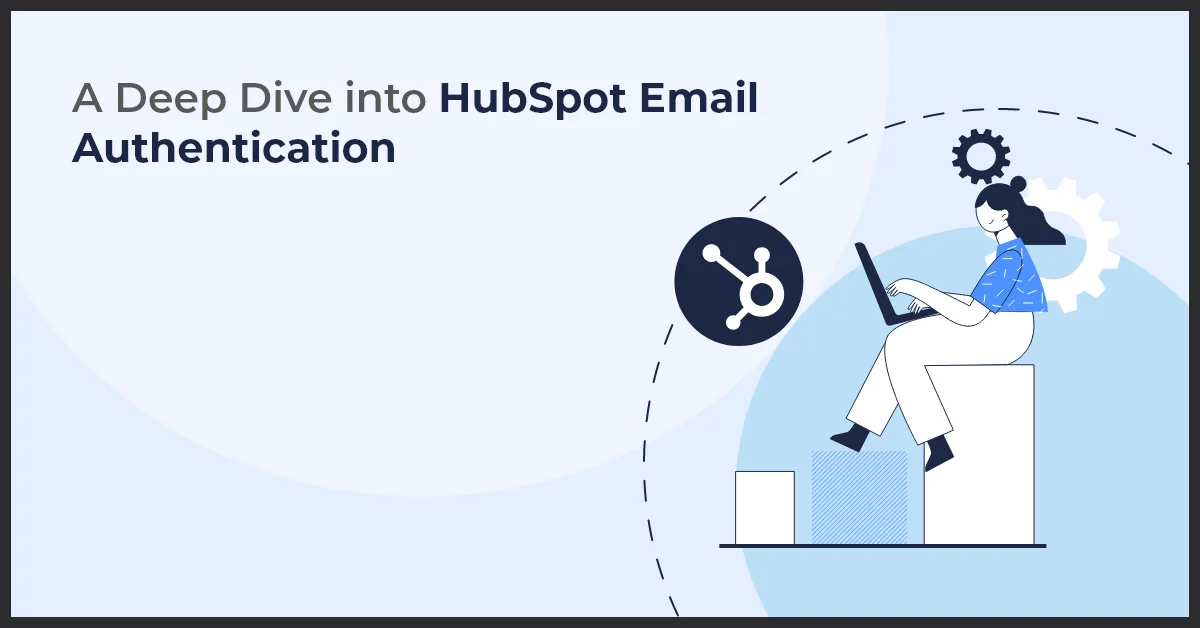Battle of the CRMs: HubSpot Vs Salesforce – Which Is Better for Your Business?

Published on: July 8, 2021
Updated on: March 28, 2024
268 Views
- HubSpot
9 min read
HubSpot vs Salesforce: Choosing the Right CRM for Your Business
Discover the power of CRM software and how it can revolutionize your business operations. In today's competitive landscape, customer relationship management (CRM) software is key to driving growth, enhancing customer satisfaction, and streamlining your sales and marketing efforts.
Two leading contenders in the CRM arena are HubSpot and Salesforce. Both platforms have gained significant popularity and are known for their powerful features, robust integrations, and user-friendly interfaces. Let's dive into a comparison of these two industry giants to help you make an informed decision.
When we talk about CRM software, many people in the industry think about Salesforce. Granted, that Salesforce CRM has been in the game for the longest time, but it doesn’t mean that there are no alternatives.
In fact, Salesforce might not even be an ideal solution for all organizations. The alternative? HubSpot CRM is a platform that has been ranked as a genuine competitor to Salesforce consistently. So, on what grounds should you compare HubSpot vs Salesforce to make the right decision?
Should you go for the much older and established Salesforce CRM or should you go for an easy-to-use HubSpot CRM that is considered to be a viable alternative to Salesforce? Find the answers to all your HubSpot Vs Salesforce questions in the following lines as we compare the two biggest names in the CRM space.
Background on Salesforce
When it comes to Customer Relationship Management (CRM) software providers, Salesforce stands out as a leader in the industry. With its wide range of features and capabilities, it has become the go-to choice for businesses of all sizes.
With its inception in 1999, Salesforce has come a long way, constantly innovating and enabling businesses to streamline their sales, marketing, and customer service operations. Its user-friendly interface and extensive customization options make it a favorite among businesses across various industries.
One of the key factors that sets Salesforce apart is its reputation. It has built a strong brand image as a reliable and trustworthy CRM solution provider. This is evident from its vast customer base, which includes small businesses, mid-sized companies, and large enterprises.
When it comes to market share, Salesforce holds a significant position, capturing a considerable portion of the CRM market. Its consistent growth and market dominance have made it a force to be reckoned with.
Furthermore, Salesforce has gained widespread industry recognition for its contribution to the CRM space. It has received numerous accolades and awards for its innovative product offerings, exceptional customer service, and commitment to driving customer success.
One area where Salesforce particularly excels is its stronghold among Enterprise customers. Many Fortune 500 companies rely on Salesforce to manage their customer data, handle complex sales processes, and enhance their overall customer experience. Its scalability and robustness make it an ideal choice for large enterprises with complex CRM needs.
Background on HubSpot
HubSpot is a leading customer relationship management (CRM) platform that has been making waves in the market. Founded in 2006, HubSpot aimed to revolutionize the way businesses approach marketing and sales. With its innovative software, HubSpot quickly gained recognition as a game-changer.
At the core of HubSpot's offering is its CRM, which provides businesses with the tools they need to manage and nurture their leads effectively. HubSpot's CRM is designed to streamline the sales process, making it easier for businesses to close deals and grow their customer base.
One of HubSpot's key differentiators is its strong focus on inbound marketing. In today's digital landscape, consumers are increasingly turning to inbound marketing strategies, which involve attracting customers organically through content creation and engagement. HubSpot's CRM supports these inbound marketing efforts by providing tools for content creation, social media management, and email marketing.
Another standout feature of HubSpot is its sales automation capabilities. With HubSpot, businesses can automate various sales processes, such as lead scoring, email sequences, and even follow-up reminders. This automation not only saves time and effort but also ensures that no leads fall through the cracks.
HubSpot's intuitive interface and user-friendly features have contributed to its growing popularity among small and medium-sized businesses. Unlike complex and expensive CRM systems, HubSpot is accessible to businesses of all sizes, allowing them to compete with larger competitors on a level playing field.
In conclusion, HubSpot's emergence in the market has been driven by its innovative CRM, focus on inbound marketing, and sales automation capabilities. Its popularity among small and medium-sized businesses is a testament to its effectiveness in helping businesses grow and thrive in the digital age.
HubSpot Vs Salesforce: Let’s Resolve the CRM Dilemma
Cost
Let’s start with the most important factor for any business - the cost. HubSpot CRM can be used for Sales, Marketing, and Service. You can get started with HubSpot at $25/month, followed by $80/user/month for the Professional plan. The Enterprise plan starts at $120/user/month, and all of the plans are billed annually.
On the other hand, Salesforce is considered to be expensive. They offer their essential plan at $25/user/month. However, for advanced functionalities, the Salesforce CRM users can end up paying up to $150/user/month for the Enterprise version of the Sales Cloud. You need to bear additional costs associated with Marketing and Service Cloud, and other related integrations to get customized solutions from Salesforce.
Takeaway: Salesforce is definitely more expensive out of the two and you also need special admins and teams to develop your CRM functionalities properly. Contrary to it, HubSpot spend increases as your business expands and the cost of ownership is less in HubSpot when compared to Salesforce.
User Interface
Both Hubspot and Salesforce streamline customer-related data including contacts and leads. Since businesses have to deal with a lot of data on a daily basis, it is crucial to know the strengths and weaknesses of each platform.
Salesforce CRM software offers a lot of customization options when it comes to adding tabs like Tasks, Sales Groups, Files, and Quotes along with the standard tabs on the dashboard. For a complex organization, Salesforce is a go-to CRM and you will most likely get a dedicated account manager to optimize your needs.
HubSpot can be set up easily in a matter of minutes as the basic version is free to use and there is no need to go through a complicated sales process or implementation before getting started. HubSpot is easier to understand but doesn’t offer as many customization options as HubSpot.
Lead Generation and Management
Both the platforms offer lead capturing capabilities and can easily import contact information into your system when an inquiry is made on your business website.
HubSpot’s primary focus is on inbound and content marketing and you can leverage it to generate leads quickly. In addition, you can use HubSpot’s content management system (CMS) to publish content pieces like whitepapers, blog posts, articles, and more that help in generating more leads into your CRM.
However, when working with Salesforce, you need to do the aforementioned activities and tasks using a separate platform like Marketo and then integrate the same with your Salesforce interface. You can leverage the customization available in Salesforce and create lead assignment rules and establish security access levels to manage every aspect of your lead nurturing process.
Integrations
Scattered data often leads to a loss in productivity and if your technology stack doesn’t have the right tools, you are bound to go down the incorrect path. That is where integrations come into the picture. Every good CRM can be integrated easily with multiple applications. Let’s see how the integration factor works when we talk about HubSpot Vs Salesforce.
Salesforce users can get apps to integrate from AppExchange and extend their Salesforce interface with over 3,400 integrations.
HubSpot’s App Marketplace features over 500 integrations that can be set up easily like other popular apps that you probably use.
Customer Support
Salesforce CRM software customers receive a standard support package that allows them to raise support tickets, get access to customer success committees, and a guaranteed 2-day response time. With a premium plan, you can have a dedicated success manager, 24/7 support over the phone, and a guaranteed 1-hour issue resolution time.
With HubSpot CRM, you get a similar help desk support package but the premium version with technical assistance and customer success support comes at an additional cost. As far as on-boarding is concerned, HubSpot CRM’s remote onboarding session costs around $1500 and the advanced support sessions related to customization can cost up to $5000. However, even the free users receive responses within 24 hours.
Reporting and Analytics
When we talk about Analytics, HubSpot CRM has never been a stronger contender. However, the recent updates and the launch of revenue attribution reporting have really helped HubSpot in improving its reporting and analytics capabilities.
On the other hand, Salesforce CRM is well known for its powerful and robust reporting capabilities and they are extensively customizable. However, the customizations take a lot of time to deploy properly and you also require training to master the interface.
Takeaway: While Salesforce is better when it comes to reporting and analytics, HubSpot is a better option if you want easier implementation.
HubSpot Vs Salesforce: Which Platform is Better for Your Business?
HubSpot vs Salesforce CRM: Both platforms cater to two very different types of businesses. If you are looking for a cost-effective and easy-to-use CRM solution, then HubSpot is better for you. But if you have a complex sales process, a consistently increasing user base, and a requirement for in-depth reporting features, then Salesforce is the right choice for your business.
Here is a quick recap of each platform’s key features.
Wrapping Up
For most businesses, the HubSpot Vs Salesforce CRM dilemma continues to be a major concern. But we hope that after reading this article, you will have a better understanding of both the platforms and you will be able to choose the right CRM solution for your business.
To know more about CRM development, enlist the help of our Salesforce and Hubspot experts today. Our team of seasoned professionals can guide you through the entire process and help you find the right CRM solution for you based on your preferences.
To know more about our CRM services, write to us at info@growthnatives.com or talk to us here.



